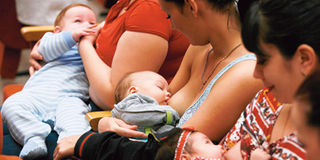Dilemma of exclusive breastfeeding

Mothers breastfeed their babies during a flash mob event at the State Medical University in Russia’s Siberian city of Krasnoyarsk, October 25, 2013. About 70 young women took part in the event to mark the beginning of the annual Breastfeeding Week and to promote feeding children with natural milk instead of substitutes, according to the city’s Centre of Breastfeeding who organized the event. PHOTO |FILE
What you need to know:
- Rabia Dinde, a special needs teacher in Tabora Region, knows all about that. She recently spoke to The Citizen in Dar es Salaam, explaining how that decision was never easy. As a mother of three, she has had varying experiences with breastfeeding her children.
- When she had her first born ten years ago, she was able to exclusively breastfeed for the first six months. Her working station was close by, so she was able to go home every few hours to breastfeed her baby. But she had to introduce other food earlier for her other children since she worked far from home.
Dar es Salaam. It is a personal conflict that new mothers have to face. ‘What should I do now that the three months of maternity leave are over? Should I provide my baby with formula milk while I’m at work? Should I instruct my house help to give my baby little porridge?
Rabia Dinde, a special needs teacher in Tabora Region, knows all about that. She recently spoke to The Citizen in Dar es Salaam, explaining how that decision was never easy. As a mother of three, she has had varying experiences with breastfeeding her children. When she had her first born ten years ago, she was able to exclusively breastfeed for the first six months. Her working station was close by, so she was able to go home every few hours to breastfeed her baby. But she had to introduce other food earlier for her other children since she worked far from home.
“My husband is a doctor and he has been very helpful in taking care of our children. It was through him that I learnt the importance of exclusive breastfeeding. Sadly, I was unable to do this with my second and third born. It was hard, to know something must be done and not being able to do it. I think it is a choice many working women do not have the luxury of making,” she says.
She recalls how her friend recently lost her baby. “My friend wasn’t eating well. She would eat peanuts and corn during the day. She had no milk. And didn’t feed her baby properly. In the end, she lost her baby,” she says.
The World Health Organisation (WHO) defines exclusive breastfeeding as the practice of only giving an infant breast-milk for the first six months of life (no other food or water). If women knew how important it was for them to exclusively breastfeed their babies, they wouldn’t stop, says Dr Rehema Mzimbiri, Tanzania Food and Nutrition Centre nutritionist and researcher. The mother’s milk is very nutritious, she says. It is even related to increasing brain development as the child grows older. Moreover, the breastmilk helps increase the baby’s immunity against diseases.
According to the World Bank (WB), breastfeeding also protects the health of women by reducing the risk of breast and ovarian cancer, diabetes, and heart disease. Increased breastfeeding rates could prevent 20,000 maternal deaths each year from breast cancer alone. It is also one of the Sustainable Development Goals (SDGs).
“Women should know that the law allows them to be on leave for three months after they deliver. The International Labour Organisation (ILO) supports breastfeeding this way. As a new mother, you also need time to rest. This is good because they are able to breastfeed exclusively,” she says.
“But this is not enough,” says Koku Kombeson, an administrator with a PR firm in Mbeya Region. She was out of work when she had her daughter two years ago. This was a blessing in disguise, she says, because she didn’t worry about the logistics of breastfeeding her.
But now, another baby is on the way. As the main breadwinner in her home, she needs the job. But she also needs to raise a healthy baby. She explains that no woman is exempted from this. “I don’t know what I will do. I guess I will do what every mother does after three months. Go back to work and wish you were home with your baby,” she says.
Mothers need to know that stunting starts when the baby is in her womb, says Tufingene Malambugi, a Nutrition officer at the ministry of Health, Community Development, Gender, Elderly and Children under Preventive Services.
She explains that the first thousand days are very important in the life of a mother and her baby. This is the time when they both need enough food and nutrients; the baby must be breastfed exclusively for the first six months; and have at least five meals a day once they can start eating solids.
“There are two types of malnutrition. Undernutrition, which is stunting; and overnutrition, which is obesity. Sadly, mothers start giving formula milk to children quite early which increases the chances of their baby becoming obese,” she explains. She further points out that breastfeeding is very much connected to stunting. If newborns aren’t well breastfed, and if their mothers do not eat well, there are high chances that the baby will be stunted.
According to Lishe News, a nutrition journal published by Panita (Partnership for Nutrition in Tanzania), more than 2, 700,000 children under five years of age were stunted in Tanzania in 2015. Out of the stunted children, 58 per cent live in 10 regions; most of these regions are not benefiting from key nutrition interventions. About 435,000 children less than five years of age suffers from acute malnutrition including more than 105, 000 severely acute malnourished.
Global Nutrition Goals 2025 seeks to scale up nutrition by having 50 per cent of infants aged less than 6 months exclusively breastfed. In Tanzania, two babies out of five are exclusively breastfed. This increases the infant mortality rate in the country.
This is why mothers need the community support to provide the best environment for them to feed their newborns well, says Tufingene. “What is a mother’s source of information? Sometimes, she learns wrong things from her friends. If we can educate the community about breastfeeding, we can support exclusive breastfeeding even more,” she says.
It is more than that, says Koku. It is high time that changes were made in the labour law to accommodate breastfeeding in the workplace. And Tanzania wouldn’t be the first to do this. Earlier this year, the BBC reported that “Kenya’s parliament had approved a Bill which would force companies to set aside special breastfeeding areas for employees with children.” It was reported that the breastfeeding stations would include breast pumps for expressing milk and fridges. The bill also states that employers must give time for women to breastfeed.
“We hope that our lawmakers will also see the need to create a working environment conducive to breastfeeding. This is the only way we can raise a healthy generation,” she says.



